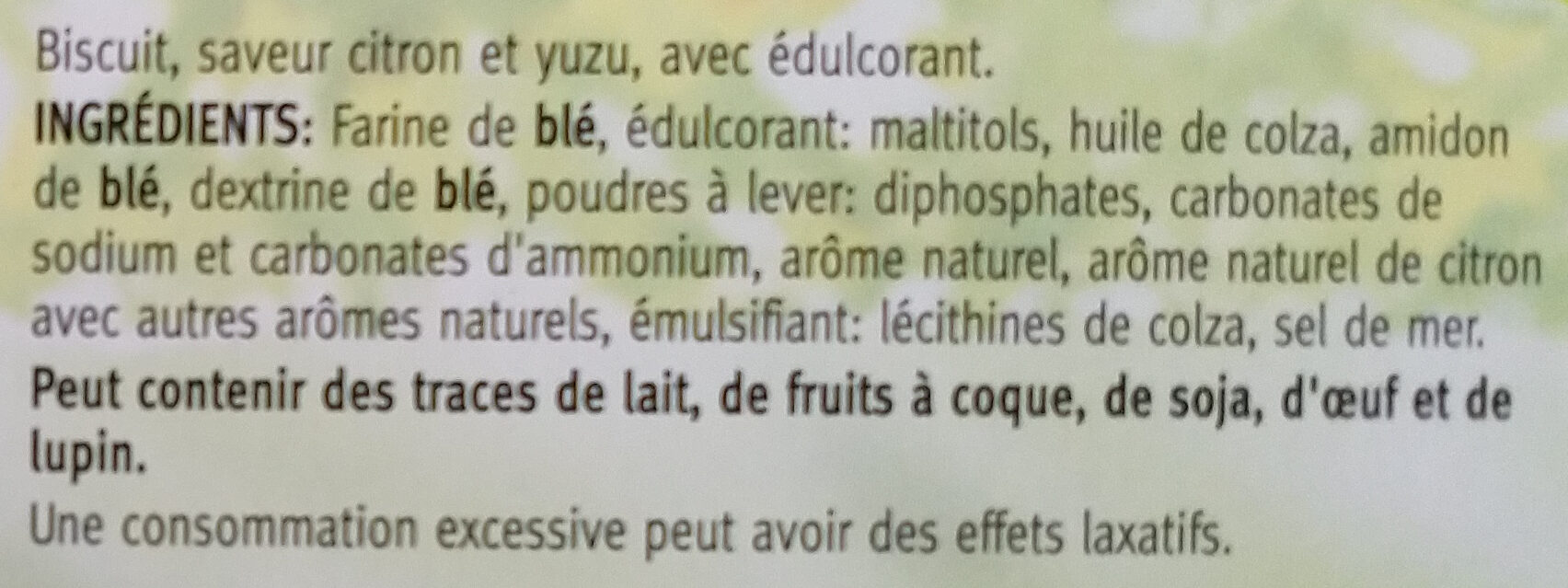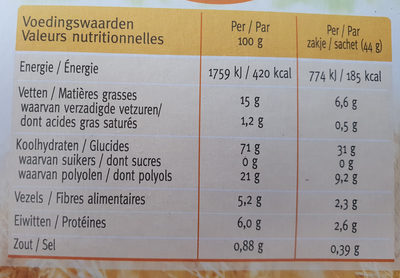Help us make food transparency the norm!
As a non-profit organization, we depend on your donations to continue informing consumers around the world about what they eat.
The food revolution starts with you!
Biscuits Sans Sucre Citron / Yuzu - Cereal - 132 g
Biscuits Sans Sucre Citron / Yuzu - Cereal - 132 g
This product page is not complete. You can help to complete it by editing it and adding more data from the photos we have, or by taking more photos using the app for Android or iPhone/iPad. Thank you!
×
Barcode: 5410063033016 (EAN / EAN-13)
Quantity: 132 g
Brands: Cereal
Categories: Snacks, Sweet snacks, Biscuits and cakes, Biscuits
Labels, certifications, awards:
Green Dot
Stores: Delhaize
Countries where sold: Belgium
Matching with your preferences
Health
Ingredients
-
16 ingredients
: Farine de blé, édulcorant: maltitols, huile de colza, amidon de blé, dextrine de blé, poudres à lever: diphosphates, carbonates de sodium et carbonates d'ammonium, arôme naturel, arôme naturel de citron avec autres arômes naturels, émulsifiant: lécithines de colza, sel de mer. Peut contenir des traces de lait, de fruits à coque, de soja, d'oeuf et de lupin.Allergens: GlutenTraces: Eggs, Lupin, Milk, Nuts, Soybeans
Food processing
-
Ultra processed foods
Elements that indicate the product is in the 4 - Ultra processed food and drink products group:
- Additive: E1400 - Dextrin
- Additive: E322 - Lecithins
- Additive: E450 - Diphosphates
- Additive: E965 - Maltitol
- Ingredient: Emulsifier
- Ingredient: Flavouring
- Ingredient: Sweetener
Food products are classified into 4 groups according to their degree of processing:
- Unprocessed or minimally processed foods
- Processed culinary ingredients
- Processed foods
- Ultra processed foods
The determination of the group is based on the category of the product and on the ingredients it contains.
Additives
-
E1400 - Dextrin
Dextrin: Dextrins are a group of low-molecular-weight carbohydrates produced by the hydrolysis of starch or glycogen. Dextrins are mixtures of polymers of D-glucose units linked by α--1→4- or α--1→6- glycosidic bonds. Dextrins can be produced from starch using enzymes like amylases, as during digestion in the human body and during malting and mashing, or by applying dry heat under acidic conditions -pyrolysis or roasting-. The latter process is used industrially, and also occurs on the surface of bread during the baking process, contributing to flavor, color and crispness. Dextrins produced by heat are also known as pyrodextrins. The starch hydrolyses during roasting under acidic conditions, and short-chained starch parts partially rebranch with α--1‚6- bonds to the degraded starch molecule. See also Maillard Reaction. Dextrins are white, yellow, or brown powders that are partially or fully water-soluble, yielding optically active solutions of low viscosity. Most of them can be detected with iodine solution, giving a red coloration; one distinguishes erythrodextrin -dextrin that colours red- and achrodextrin -giving no colour-. White and yellow dextrins from starch roasted with little or no acid are called British gum.Source: Wikipedia
-
E322 - Lecithins
Lecithins are natural compounds commonly used in the food industry as emulsifiers and stabilizers.
Extracted from sources like soybeans and eggs, lecithins consist of phospholipids that enhance the mixing of oil and water, ensuring smooth textures in various products like chocolates, dressings, and baked goods.
They do not present any known health risks.
-
E322i - Lecithin
Lecithins are natural compounds commonly used in the food industry as emulsifiers and stabilizers.
Extracted from sources like soybeans and eggs, lecithins consist of phospholipids that enhance the mixing of oil and water, ensuring smooth textures in various products like chocolates, dressings, and baked goods.
They do not present any known health risks.
-
E450 - Diphosphates
Diphosphates (E450) are food additives often utilized to modify the texture of products, acting as leavening agents in baking and preventing the coagulation of canned food.
These salts can stabilize whipped cream and are also found in powdered products to maintain their flow properties. They are commonly present in baked goods, processed meats, and soft drinks.
Derived from phosphoric acid, they're part of our daily phosphate intake, which often surpasses recommended levels due to the prevalence of phosphates in processed foods and drinks.
Excessive phosphate consumption is linked to health issues, such as impaired kidney function and weakened bone health. Though diphosphates are generally regarded as safe when consumed within established acceptable daily intakes, it's imperative to monitor overall phosphate consumption to maintain optimal health.
-
E500 - Sodium carbonates
Sodium carbonates (E500) are compounds commonly used in food preparation as leavening agents, helping baked goods rise by releasing carbon dioxide when they interact with acids.
Often found in baking soda, they regulate the pH of food, preventing it from becoming too acidic or too alkaline. In the culinary world, sodium carbonates can also enhance the texture and structure of foods, such as noodles, by modifying the gluten network.
Generally recognized as safe, sodium carbonates are non-toxic when consumed in typical amounts found in food.
-
E503 - Ammonium carbonates
Ammonium carbonate: Ammonium carbonate is a salt with the chemical formula -NH4-2CO3. Since it readily degrades to gaseous ammonia and carbon dioxide upon heating, it is used as a leavening agent and also as smelling salt. It is also known as baker's ammonia and was a predecessor to the more modern leavening agents baking soda and baking powder. It is a component of what was formerly known as sal volatile and salt of hartshorn.Source: Wikipedia
-
E965 - Maltitol
Maltitol: Maltitol is a sugar alcohol -a polyol- used as a sugar substitute. It has 75–90% of the sweetness of sucrose -table sugar- and nearly identical properties, except for browning. It is used to replace table sugar because it is half as caloric, does not promote tooth decay, and has a somewhat lesser effect on blood glucose. In chemical terms, maltitol is known as 4-O-α-glucopyranosyl-D-sorbitol. It is used in commercial products under trade names such as Lesys, Maltisweet and SweetPearl.Source: Wikipedia
Ingredients analysis
-
Palm oil free
No ingredients containing palm oil detected
-
Maybe vegan
Ingredients that may not be vegan: Natural flavouring, Natural flavouring
-
Maybe vegetarian
Ingredients that may not be vegetarian: Natural flavouring, Natural flavouring
-
Details of the analysis of the ingredients
: Farine de blé, édulcorant (maltitols), huile de colza, amidon de blé, dextrine de blé, poudres à lever (diphosphates), carbonates de sodium, carbonates d'ammonium, arôme naturel, arôme naturel de citron, arômes naturels, émulsifiant (lécithines de colza), sel de mer- Farine de blé -> en:wheat-flour - vegan: yes - vegetarian: yes - ciqual_proxy_food_code: 9410 - percent_min: 7.69230769230769 - percent_max: 100
- édulcorant -> en:sweetener - percent_min: 0 - percent_max: 50
- maltitols -> en:e965 - vegan: yes - vegetarian: yes - percent_min: 0 - percent_max: 50
- huile de colza -> en:colza-oil - vegan: yes - vegetarian: yes - from_palm_oil: no - ciqual_food_code: 17130 - percent_min: 0 - percent_max: 33.3333333333333
- amidon de blé -> en:wheat-starch - vegan: yes - vegetarian: yes - ciqual_proxy_food_code: 9510 - percent_min: 0 - percent_max: 25
- dextrine de blé -> bg:пшеничен-декстрин - vegan: yes - vegetarian: yes - percent_min: 0 - percent_max: 20
- poudres à lever -> en:raising-agent - percent_min: 0 - percent_max: 16.6666666666667
- diphosphates -> en:e450 - vegan: yes - vegetarian: yes - percent_min: 0 - percent_max: 16.6666666666667
- carbonates de sodium -> en:e500 - vegan: yes - vegetarian: yes - percent_min: 0 - percent_max: 14.2857142857143
- carbonates d'ammonium -> en:e503 - vegan: yes - vegetarian: yes - percent_min: 0 - percent_max: 12.5
- arôme naturel -> en:natural-flavouring - vegan: maybe - vegetarian: maybe - percent_min: 0 - percent_max: 5
- arôme naturel de citron -> en:natural-lemon-flavouring - vegan: yes - vegetarian: yes - percent_min: 0 - percent_max: 5
- arômes naturels -> en:natural-flavouring - vegan: maybe - vegetarian: maybe - percent_min: 0 - percent_max: 5
- émulsifiant -> en:emulsifier - percent_min: 0 - percent_max: 5
- lécithines de colza -> en:rapeseed-lecithin - vegan: yes - vegetarian: yes - percent_min: 0 - percent_max: 5
- sel de mer -> en:sea-salt - vegan: yes - vegetarian: yes - ciqual_food_code: 11082 - percent_min: 0 - percent_max: 0.9
Nutrition
-
Good nutritional quality
⚠ ️Warning: the amount of fruits, vegetables and nuts is not specified on the label, it was estimated from the list of ingredients: 11This product is not considered a beverage for the calculation of the Nutri-Score.
Positive points: 8
- Proteins: 3 / 5 (value: 6, rounded value: 6)
- Fiber: 5 / 5 (value: 5.2, rounded value: 5.2)
- Fruits, vegetables, nuts, and colza/walnut/olive oils: 0 / 5 (value: 11.5384615384615, rounded value: 11.5)
Negative points: 9
- Energy: 5 / 10 (value: 1757, rounded value: 1757)
- Sugars: 0 / 10 (value: 0, rounded value: 0)
- Saturated fat: 1 / 10 (value: 1.2, rounded value: 1.2)
- Sodium: 3 / 10 (value: 360, rounded value: 360)
The points for proteins are counted because the negative points are less than 11.
Nutritional score: (9 - 8)
Nutri-Score:
-
Nutrient levels
-
Fat in moderate quantity (15%)
What you need to know- A high consumption of fat, especially saturated fats, can raise cholesterol, which increases the risk of heart diseases.
Recommendation: Limit the consumption of fat and saturated fat- Choose products with lower fat and saturated fat content.
-
Saturated fat in low quantity (1.2%)
What you need to know- A high consumption of fat, especially saturated fats, can raise cholesterol, which increases the risk of heart diseases.
Recommendation: Limit the consumption of fat and saturated fat- Choose products with lower fat and saturated fat content.
-
Sugars in low quantity (0%)
What you need to know- A high consumption of sugar can cause weight gain and tooth decay. It also augments the risk of type 2 diabetes and cardio-vascular diseases.
Recommendation: Limit the consumption of sugar and sugary drinks- Sugary drinks (such as sodas, fruit beverages, and fruit juices and nectars) should be limited as much as possible (no more than 1 glass a day).
- Choose products with lower sugar content and reduce the consumption of products with added sugars.
-
Salt in moderate quantity (0.9%)
What you need to know- A high consumption of salt (or sodium) can cause raised blood pressure, which can increase the risk of heart disease and stroke.
- Many people who have high blood pressure do not know it, as there are often no symptoms.
- Most people consume too much salt (on average 9 to 12 grams per day), around twice the recommended maximum level of intake.
Recommendation: Limit the consumption of salt and salted food- Reduce the quantity of salt used when cooking, and don't salt again at the table.
- Limit the consumption of salty snacks and choose products with lower salt content.
-
-
Nutrition facts
Nutrition facts As sold
for 100 g / 100 mlCompared to: Biscuits Energy 1,757 kj
(420 kcal)-10% Fat 15 g -25% Saturated fat 1.2 g -87% Carbohydrates 71 g +11% Sugars 0 g -100% Polyols (sugar alcohols) 21 g +58% Fiber 5.2 g +82% Proteins 6 g -4% Salt 0.9 g +49% Fruits‚ vegetables‚ nuts and rapeseed‚ walnut and olive oils (estimate from ingredients list analysis) 11.538 %
Environment
-
Eco-Score C - Moderate environmental impact
⚠ ️Select a country in order to include the full impact of transportation.The Eco-Score is an experimental score that summarizes the environmental impacts of food products.→ The Eco-Score was initially developped for France and it is being extended to other European countries. The Eco-Score formula is subject to change as it is regularly improved to make it more precise and better suited to each country.Life cycle analysis
-
Average impact of products of the same category: B (Score: 69/100)
Category: Biscuit (cookie)
Category: Biscuit (cookie)
- PEF environmental score: 0.35 (the lower the score, the lower the impact)
- including impact on climate change: 2.88 kg CO2 eq/kg of product
Stage Impact Agriculture
80.5 %Processing
11.8 %Packaging
3.1 %Transportation
3.2 %Distribution
1.4 %Consumption
0.0 %
Bonuses and maluses
-
Missing origins of ingredients information
Malus: -5
⚠ ️ The origins of the ingredients of this product are not indicated.
If they are indicated on the packaging, you can modify the product sheet and add them.
If you are the manufacturer of this product, you can send us the information with our free platform for producers.
-
Missing packaging information for this product
Malus: -15
⚠ ️ The information about the packaging of this product is not filled in.⚠ ️ For a more precise calculation of the Eco-Score, you can modify the product page and add them.
If you are the manufacturer of this product, you can send us the information with our free platform for producers.
Eco-Score for this product
-
Impact for this product: C (Score: 49/100)
Product: Biscuits Sans Sucre Citron / Yuzu - Cereal - 132 g
Life cycle analysis score: 69
Sum of bonuses and maluses: -20
Final score: 49/100
-
Carbon footprint
-
Equal to driving 1.5 km in a petrol car
288 g CO² per 100g of product
The carbon emission figure comes from ADEME's Agribalyse database, for the category: Biscuit (cookie) (Source: ADEME Agribalyse Database)
Stage Impact Agriculture
82.9 %Processing
7.9 %Packaging
3.8 %Transportation
4.7 %Distribution
0.7 %Consumption
0.0 %
Packaging
-
Missing packaging information for this product
⚠ ️ The information about the packaging of this product is not filled in.Take a photo of the recycling information Take a photo of the recycling information
Transportation
-
Origins of ingredients
Missing origins of ingredients information
⚠ ️ The origins of the ingredients of this product are not indicated.
If they are indicated on the packaging, you can modify the product sheet and add them.
If you are the manufacturer of this product, you can send us the information with our free platform for producers.Add the origins of ingredients for this product Add the origins of ingredients for this product
Report a problem
-
Incomplete or incorrect information?
Category, labels, ingredients, allergens, nutritional information, photos etc.
If the information does not match the information on the packaging, please complete or correct it. Open Food Facts is a collaborative database, and every contribution is useful for all.
Data sources
Product added on by kiliweb
Last edit of product page on by moon-rabbit.
Product page also edited by countrybot, max33, nicolas-2020, openfoodfacts-contributors, yuka.UJVNI9rRJeoMFciM4YY__BuRHvzbOKdUAUcKoQ, yuka.VklFdkZvb2ZtdG8xeS9FSHhqM0Vxc3hNNUpPalUwS3FJdFJOSUE9PQ, yuka.YklzZ0ZQVUJxdlVNb01RWXhTUFQ2UEZTNHFTV0FFL3FlOWhCSVE9PQ.










